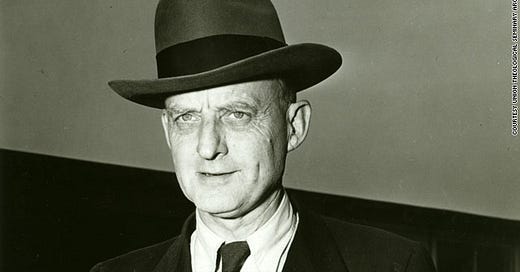To Believe in the Impossibility of Climate Justice
Reflections on Moral Man and Immoral Society, A Book by Reinhold Niebuhr
I may be a few days late on reflecting on my introductory session of the Faith and Climate Action protest, but I still want to jot down as much as possible here. The main speaker from LSE’s Grantham Institute was both extremely knowledgeable and inspirational. The overall message I took from her remarks is that we should recall the philosopher Antonio Gramsci’s famous distinction between pessimism of intellect and optimism of will.
Something that is often missed in the doom and gloom of the journalistic reports on climate change— and to be sure there is plenty to be gloomy about—is there is still plenty of time for action to meet the IPCC’s targets of 1.5 degrees Celsius. And it doesn’t quite require the radical disruptions of the kind Extinction Rebellion advocates in setting the decarbonization target for less than 6 years. But it does require governments around the world to take concerted action to reduce net emissions down to zero by 2050. That is no small feat, and will require some mental gymnastics— many might be inclined to call it faith— to reimagine what is possible.
Here, I want to transition to the theologian Reinhold Niebuhr’s essential observation that man, if he is disaggregated from societal forces pulling him in different, often contradictory, directions is fundamentally moral and rational. The problem is that man becomes more immoral and irrational when is compelled to participate in society. This observation, a foundational belief of President Carter’s, intersects powerfully with the Reverend of the LSE Faith Centre’s thoughts of how human beings are pulled in different directions by nationalism, populism, and chasing the dollar, and they need to be pulled down to where they belong, which is with God’s great creation, our one and only home.
The odd thing about reading Niebuhr’s classic through the lens of the current climate crisis is the way he foreshadows the great moral problem of our time on literally the first page:
“Unfortunately, the conquest of nature… has not eased, but rather accentuated the problem of justice.” He clearly sets the stakes, writing that, “It may be that there may be no salvation from the burdens of injustice until the ominous tendency in human history has resulted in perfect tragedy.”
The question he considers in the next 200 pages is how to avert perfect tragedy. He emphasizes that the goal should not be the exact opposite of perfect tragedy, of perfect justice but enough justice. Nonetheless, the vision of perfect justice is a valuable illusion, and it is vitally important that reason only tempers rather extinguishes the flames of passion ignited by the drive for perfect justice.
I found Rev. Chalmers Kiergaard quote on how the belief in God is to believe the impossible to be relevant to a passage that struck me:
“Without the passion of religion, no society will ever have the courage to conquer despair and attempt the impossible…The vision of a just society is an impossible one, which can only be approximately by those who do not regard it as impossible.” He adds that, “What religion believes is not wholly true, but ought to be true, and may become true if it is not doubted.”
In Niebuhr’s view, religion believes that all people ought to transcend their tribal differences and master the art of living together—with themselves and with the planet—without conflict or coercion.

The reason why the conquest of nature has not brought an acceptable level of justice much less perfect justice is implied in the word “conquest”. Humanity is not living with the planet but over it. We need to relearn the message from the Daoist sage Laozi, “Creation without possession, to serve others without self-assertion, and development without domination. This is the way of the Dao.” This line is illuminating as a personal philosophy, but it is in some ways more directly relevant as a treatise to live with nature. We need to learn how to contribute to the planet rather than dominate it. That vision may be utopian, but the purpose of Utopia is for walking, so the vision of perfect environmental justice may be approximated.



